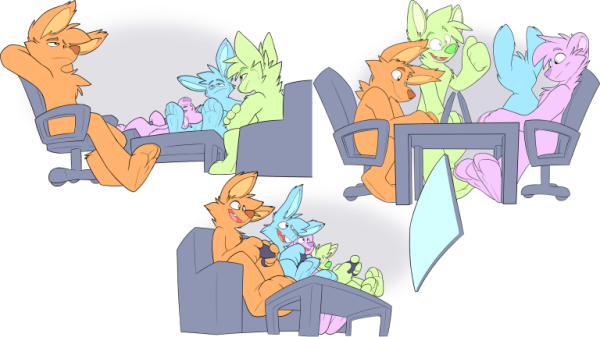I probably don’t need to remind anyone reading this while it’s fresh about the current state of affairs in the world, but for the future readers looking back on this time, let me set the stage a bit.
The Situation Today
(By “Today”, I mean early May 2020, when I started writing this series.)
In the past two months, over 26 million Americans have filed for unemployment, and an additional 14 million have been unable to file.
Federal Reserve chairman, Jerome Powell, says we’re in the worst economy ever.
In a desperate bid of economic necromancy, many government officials want to put millions more Americans at risk of COVID-19 before we can develop a vaccine and effective treatment. And we still don’t even know the long-term effects of the virus.
I’m not interested in discussing the politics of this pandemic or who to blame; I’ll leave that to everyone else with an opinion. Instead, I want to acknowledge two facts that most people probably already know:
- This was mostly avoidable with competent leadership and responsible preparation
- Most of us have rough times ahead of us
I can’t do anything about the first point (although most people are focused on it), but I want to try to alleviate the second point.
What This Series is About
Whether you lost your job and need an income to survive, or you’re one of the essential workers wanting to avoid being sacrificed by politicians for the sake of economic necromancy, I wrote this guide to help you transition into a technology career with little-to-no tech experience.
This is not a magic bullet! It will require time, focus, and effort.
But if you follow the advice on the subsequent posts in this series, you will at least have another option available to you. The value of choice, especially when you otherwise have none, is difficult to overstate.
I am not selling anything, nor are there ads on these pages.
This entire series is released under a Creative Commons Attribution-NonCommercial-ShareAlike 4.0 International License.
Why Work in Tech?
Technology careers aren’t everyone’s cup of tea, and they might be far from your first choice, but there are a couple of advantages that you should be aware of especially during this pandemic and lockdown:
- Most technology careers can be performed remotely.
- Most technology careers pay well.
The first point is especially important for folks living in rural areas hit hard by a lack of local employment opportunities.
A lot of the information and suggestions contained in this series may be applicable to other domains. However, my entire career has been in tech, so I cannot in good conscience speak to the requirements to gain employment in those industries.
Why Should We Trust You?
You shouldn’t. I encourage you to take everything I say with a grain of salt and fact-check any claims I make. Seriously.
My Background
I’m currently employed as a security engineer for a cryptography team of a larger company, although I don’t even have a Bachelor’s degree. I’ve worked with teams of all sizes on countless technology stacks.
I have been programming, in one form or another, since I was in middle school (about 18 years ago), although I didn’t start my professional career until 2011. I’ve been on both sides of bug bounty programs, including as my fursona. A nontrivial percentage of the websites on the Internet run security code I wrote under my professional name.

My Motivation
Over the past few years, I’ve helped a handful of friends (some of them furries) transition into technology careers. I am writing this series, and distributing it for free because I want to scale up the effort I used to put into mentoring.
I’m writing this series under my furry persona, and drenching the articles with queer and furry art, to make it less palatable to bigots.

Series Contents
- Building Your Support Network and/or Team
- Mapping the Technology Landscape
- Learning the Fundamental Skills
- Choosing Your Path
- Starting and Growing an Open Source Project
- Building Your C.V.
- Getting Your First Tech Job
- Starting a Technology Company
- Career Growth and Paying It Forward
The first three entries are the most important.
The header art for this entire series was created by ScruffKerfluff.
https://soatok.blog/2020/06/08/furward-momentum-introduction/
Furward Momentum (Introduction)
- Building Your Support Network and/or Team
- Mapping the Technology Landscape
- Learning the Fundamental Skills
- Choosing Your Path
- Starting and Growing an Open Source Project
- Building Your C.V.
- Getting Your First Tech Job
- Starting a Technology Company
- Career Growth and Paying It Forward
If you’re reading this, I presume you want to pursue a career in technology, but you have little-to-no work experience to cite on your resume.
https://twitter.com/JibKodi/status/907290992289751046
This is ambitious; your success is not guaranteed. But with a little bit of care and a lot of dedication, you can pull it off!
But–and I cannot emphasize this enough–you won’t do it alone.
https://twitter.com/JibKodi/status/908742571014463491
Falsehoods People Believe About Success
It’s difficult to talk about careers without stumbling into a lot of falsehoods and cognitive distortions that many of us have picked up from society over the years. Let’s take a moment to acknowledge some of these myths and delusions so we can deprogram ourselves of them.The myth of “the self-made man” needs to be retired. It’s the trifecta of widespread, harmful, and incorrect. A lot of books have been sold to people in desperate pursuit of this myth. This genre is called “self help”, which displays an amusing lack of self-awareness: If you could help yourself, what do you need the book for?
People who claim to be “self-made” are somewhere on a spectrum that ranges from breathtaking ignorance all the way to self-entitled narcissism that borders on solipsism.
I’m not here to stroke anyone’s ego or sell you anything.
Humans (and, I suppose, animals of the anthropomorphic variety) are a social species. Our career success cannot exist in a vacuum of our own ego. Anyone who wants to be self-made has doomed themselves from the offset.
No matter what you specialize in, nor how talented you are, you will always sink or swim largely based on how well you work with others. Being able to work effectively on your own is a smaller (but still important) component.
However, working well with others doesn’t mean being an ass-kisser or a push-over. You can and SHOULD say “No” to unreasonable demands. Value your time and assert your personal boundaries. If you don’t, nobody else will.
Some people seem to think (especially regarding women and queer folks) that others can get promoted through an organization by being attractive and/or sexually promiscuous. I like to ask them if they’ve ever tested their theory in their own life, and if not, why they believe it to be true.
Envy is just the shadow of narcissism, and it’s a bad look for everyone. Rather than disparaging others for career success you feel is unwarranted, wouldn’t your time be better spent on improving yourself (and helping the other people you feel are more deserving do the same, thereby cancelling out the relative trajectory of those you think are “unworthy”)?
The Simple Truth
If you want to change careers, you’re going to need the support of your friends and family (chosen or otherwise).If you don’t have any friends, or your friends are unable or unwilling to support you in your ambitions, stop what you’re doing and find people who will.
“But I don’t know anyone!”
I run a group on Telegram called Furry Technologists for furries interested in science and technology. Start there; I promise we don’t bite.
Furry Technologists Group Logo
“What if I’m not a furry?”
No problem. There are plenty of venues for folks of every background to meet each other on the Internet.For example, there’s a Slack channel called LGBTQ in Technology that I recommend to LGBTQIA+ people outside the furry fandom interested in tech work.
If you can’t locate a venue that you feel comfortable making friends in, ask around.
“What’s stopping us from pursuing our dreams? Nothing!” Art by ScruffKerfluff.
Form a Coalition or Task Force
For the remainder of this series, I’m going to assume that you’ve managed to gather a small group of 3-6 people (including yourself) to pursue this journey together.You can think of this as a coalition or task force, since your scope is a little bit wider and more ambitious than “study buddies”: You will be helping each other and holding each other accountable throughout this whole process. (Some people prefer to call such a team a “think tank”. That’s fine too.)
So choose your team carefully.
On Romance and Technology Careers
Open and/or polyamorous relationships are valid, but if you’re in one and considering pursuing a career change with only your sexual/romantic partners to support you, you may want to reconsider.Pursuing a career change is somewhat destabilizing (unless you’re already on shaky ground because the economy is totally fucked). If your only support network consists of people you’re intimate with, one of two things can go wrong:
- Relationship troubles can throw a wrench in your plans to pursue your career change, especially if the tension prevents you from studying together.
- Challenges and setbacks toward your new career can amplify minor conflicts with some or all of your partners.
The easiest way to mitigate these risks is to avoid the situation to begin with, and study with people outside of your polycule.
However, if all of you are negatively affected by the economy, you may not have another option than to work together.
Effective Communication Skills
The first thing you’ll want to work on when you’re starting this journey is effective communication. This may come naturally to a lot of people, so feel free to skip it if everyone’s up to snuff. There’s plenty to do and no time to waste, after all.Be direct. If you naturally adopt an indirect communication style, this is even more important to deliberately focus on.
Avoid blame. Even if something is their fault, the responsibility is shared among everyone. The only thing we have to blame is blame itself.
Practice echoing questions before you answer them. This shows that you understand the question, and in emotionally intense discussions, it tells the other person that you’re listening.
If you’re a book person, Thinking, Fast and Slow and Nonviolent Communication are both worth reading.
If you’re more of a video person, you can get a lot of mileage out of these TED Talks by Julian Treasure:
https://www.ted.com/talks/julian_treasure_how_to_speak_so_that_people_want_to_listen?language=en
https://www.ted.com/talks/julian_treasure_5_ways_to_listen_better/transcript?language=en
You’ll never be quite finished polishing up your soft skills, but that’s okay! You only need to be better than 50% of the people you’ll encounter to make a positive impression; and a lot of people downright suck at it. Their weakness is your opportunity.
Keeping Yourself Honest
Good intentions never work, you need good mechanisms to make anything happen.Jeff Bezos, the richest man in modern history (source)
As you work through the remainder of this series, whether you’re actively working together or focusing on different things independently and then meeting up routinely to compare notes, you’ll want to go a step beyond verbally agreeing to meet at a designated time.Write it down. Send calendar invites if you have to.
Don’t make it convenient for things to slip your mind, or else they will.
A huge part of changing careers is developing new habits, and the two that will serve you well universally in technology is taking notes and putting stuff on calendars.
And when (not if, when) something does slip for someone, have a conversation with them. Maybe you need to slow down so they can catch up. Maybe something happened in their personal life that disrupted their flow and they need to collect themselves. Be empathetic.
What You Will Be Doing Together
So you’ve built a coalition/team. What do you do with it?In the beginning, you will be looking at the different roles in the technology industry and trying to ascertain which jobs you’ll most likely succeed at. We’ll cover this in the next section, Mapping the Technology Landscape.
Once you have even a vague idea of where you’re headed, your coalition will be studying together to Learn the Fundamental Skills. Even if you’re all specializing in vastly different areas with no overlapping curricula, you’ll be pleasantly surprised how effective, “Can I explain this concept to someone outside of this specialized domain?” is towards measuring your own comprehension of the subject.
After you’ve got the hang of the fundamentals of your chosen discipline and had a chance to work together, the next step is Choosing Your Path: You must collectively decide whether you want to work for an existing company or start your own together. There are advantages and disadvantages to both choices, but in the beginning you may want to at least prepare to get hired rather than start out from scratch.
Regardless of your destination, the next step will be to gain some experience. For this step, I recommend Starting and Growing an Open Source Project. If you’re choosing the path of an employee, this will give you a chance to gain experience. If you’re choosing the path of an entrepreneur, this will give you a chance to develop a prototype solution for the kinds of problems you want to solve professionally. In either case, an open source project is the best opportunity to check your own understanding with other teams/coalitions going through a similar journey and learn from each other.
With a bit of experience under your belt from the previous step, the next step is Building Your C.V. Notice I didn’t call it a résumé. A résumé is just a document; a C.V. is also about your reputation and accomplishments within an industry.
Naturally, the step that follows is either Getting Your First Tech Job or Starting a Technology Company, depending on which path you chose after learning the fundamental skills.
The very first job of your technology career may not be what you hope for. Mine definitely wasn’t, but your mileage may vary. Thus, the final entry in this series is dedicated to Career Growth and Paying It Forward. If you’re not yet happy with where you landed, this section should help you grow your skills further and attain the role you were seeking from the offset of your journey. When you finally get to where you want to be, you’ll very likely be adept at helping your friends and community members escape from unfavorable life circumstances.
Next: Mapping the Technology Landscape
https://soatok.blog/furward-momentum-building-your-support-network-and-or-team/

